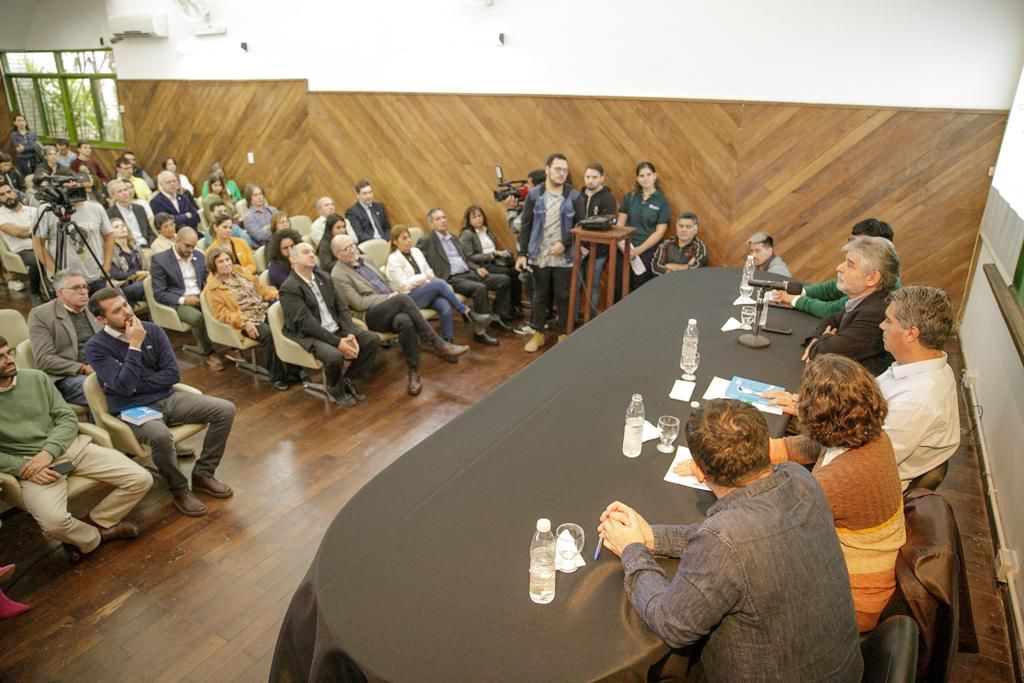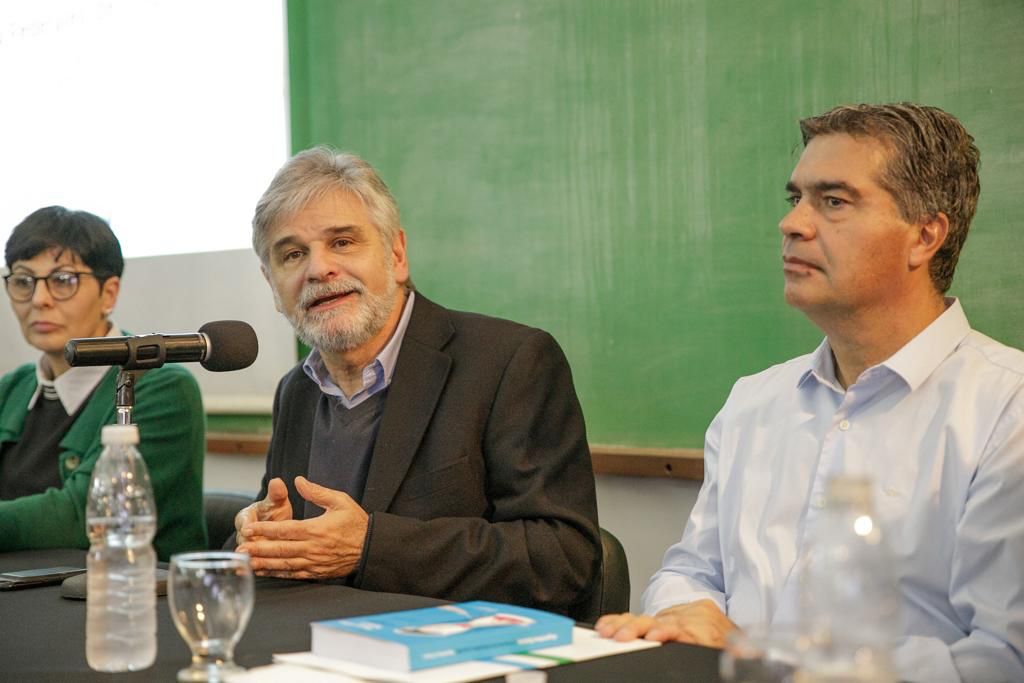Within the framework of the “Future Week”, the Minister of Science, Technology and Innovation, Daniel Filmus, participated today in Saco in the “Federalism of the XXI Century” group, together with the provincial governor Jorge Capitanich; National Director of the Economic and Social Council (CES), Patricia Vaca Narvaja; Nahuel Sosa, President of the Argentina Futura Project; and Luz Lardone, Undersecretary for the Consortium of Science, Technology and Innovation, at the headquarters of the Geohistorical Research Institute (IIGHI-CONICET-National University of the Northeast).
In his speech, Filmus pointed out: “When we discuss ‘the future’ and ‘federalism’, we are talking about the same thing to a large extent. The important thing is what kind of future. According to the ‘dependency theory’, when the process of international division of labor began, the developed Countries gave a subordinate role to underdeveloped countries, so that Latin America was a supplier of raw materials and Europe a producer of products. This inequality was not only between the center and the periphery, but also regionally and within our country, which was organized around the port of Buenos Aires, a form of articulation with the international market. The educational system reproduced the logic of dominance. : Its structure did not evolve in response to changes in the labor market – because unlike Europe and America, we did not need workers at that time – but the culture of Buenos Aires in print was national. Other parts of the country are subject to social and regional inequality; To break this dual dominance, it is necessary to do it from the perspective of social equality and above all, the region. The lack of federalism and the concentration in the port and humid Bombays are structural axes of 19th century underdevelopment that we have yet to break.
Filmus added, “One of the most obvious examples of concentration is seen in science and technology: more than 80% of the investment is placed in the metropolitan area. Our political vision of the future is related to the federalization of scientific-technological investment with a federal development perspective and not based on need, otherwise the logic would not break down, because more Requestors are more resourceful and empowered. . For example, the Northern Region received 3% of the total investment till 2021, now it receives 15%; for Chaco, it is one of the provinces that received the most equipment through the ‘Equip Science’ program. Our PFI-2023 line goes in this direction and 200 million pesos for federal innovation projects.
Minister Filmus announced the 2023 funding allocation for the lines “Federal Innovation Projects (PFI-2023)”; “Federal Technological Linkers (VITEF-2023)”; “Grants to strengthen the management capacities of jurisdictional science and technology areas that promote the delivery of programs within the framework of coordinating regional agendas”; and “Federal Interministerial Research, Transfer and Strengthening Programs for Health in the Region”. Coordination is carried out by the Federal Undersecretariat of Science, Technology and Innovation of MINCyT.
For Chaco, the province will receive an investment of 228 million pesos: PFI-2023 ($200,000,000.-); Strengthening the management capabilities of jurisdictional science and technology areas ($12,000,000.-); Federal Interministerial Research, Transfer and Strengthening Projects ($10,000,000.-); and VITEF ($6,000,000.-).
In his speech, Governor Kapitanich said: “To start the coming week, we had Minister Daniel Filmus to announce the call for federal innovation projects 2023 and funding mechanisms to improve the design of technological innovation and scientific development projects.
“Supporting these projects by allocating resources creates connections with the scientific and technological ecosystem, which creates innovation, improves entrepreneurship and productivity parameters and parameters for the development of value chains and creates quality jobs. The Argentina of the future is built with science, technology and innovation, because technology, energy and knowledge are sovereign. It has been demonstrated that the allocation, decentralization and universal use of resources is linked to the central role of the state.

Four central economic issues should be discussed within the framework of the “Argentina Futura”: monetary regime, quasi-fiscal deficit, labor informality and the possibility of a digital currency of mandatory legal tender that reduces the externalization of financial assets. , he continued. “This debate should be part of a fiscal rule that leads to equilibrium, a monetary rule that tends to stability and an exchange rate rule that promotes competitiveness,” he analyzed. He said it was the only viable model to build a country with industrial-based growth, technological and manufacturing innovation, employment and growth of regional economies.
And he continued: “We know that this is the way, we are very grateful to those who promote these initiatives, and we promise to have a place to contribute with a better consensus and contributions that should be part of a national and democratic project that includes all of us.”
Capitanich highlighted the importance of PFIs, noting that this edition will allocate a budget of $200 million per province. Between 2021 and 2022 in Chaco, the program funded 16 projects with $120 million, and with this new version, it will be $320 million over three years.
The “Week of the Future” takes place between May 29 and June 2 in Saco, Rio Negro, Buenos Aires and the Autonomous City of Buenos Aires.
About “The Week of the Future”.
In commemoration of 40 years of democracy, the “Argentina Futura” project, based on the Prime Minister, “Semana del Futuro”, is aimed at a federal, inter-ministerial and social proposal. Strengthening democracy and boosting Argentina’s productivity are essential for sustainable, comprehensive and inclusive growth
Between May 29 and June 2 in Chaco, Río Negro, Buenos Aires and the autonomous city of Buenos Aires, activities include conferences, guided tours, debates, work tables, workshops, cultural events and a place for the participation of the university community’s contributions.
The “Argentina Futura” project is a leadership platform that promotes pluralistic and diverse thinking with a federal perspective.

